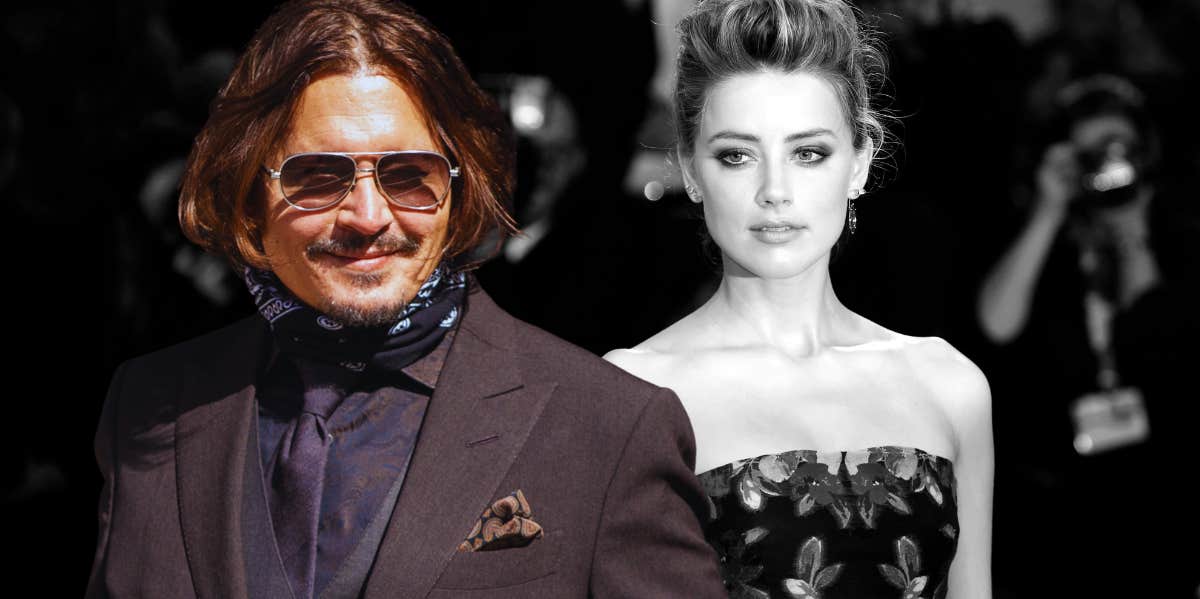Johnny Depp Says He 'Doesn't Feel Boycotted By Hollywood' & That Is A Major Problem
Instead, women continue to be the ones whose voices are silenced.
 Tom Rose, Andrea Raffin / Shutterstock
Tom Rose, Andrea Raffin / Shutterstock Johnny Depp has made his seemingly inevitable return after receiving a seven-minute standing ovation for his starring role as King Louis XV in the film Jeanne Du Barry at Cannes Film Festival.
Depp spoke about his supposed comeback after winning the 2020 anti-defamation lawsuit against his ex Amber Heard, who was ordered to pay Depp $10 million in damages. At a press conference, he offered an answer to the question of whether he felt boycotted by Hollywood, and the response he gave is emblematic of the complex convergence between power, abuse, and fame in American society.
Johnny Depp claimed, ‘I don’t feel boycotted by Hollywood,’ proving the inherent and harmful gender imbalance in the industry.
Continuing, Depp proclaimed, "I don't think about Hollywood," — a statement is not only privileged, but it’s also dangerous. The 59-year-old actor, whose net worth is $150 million, clearly does think about Hollywood, or he wouldn’t sue media outlets for defamation simply because they reported on allegations against him. He thinks about his public image enough to want it protected.
As an A-list actor, Depp wields an enormous amount of power and influence in Hollywood, so much so that he remains gainfully employed while Amber Heard left the US for Spain in order to find some semblance of peace and privacy.
In answering the question of whether he felt boycotted in Hollywood, Depp stated, “You’d have to not have a pulse to feel like, ‘No. None of this is happening. It’s a weird joke.’ When you’re asked to resign from a film you’re doing because of something that is merely a function of vowels and consonants floating in the air, yes, you feel boycotted.”
He appeared to be referring to stepping away from his role in The Fantastic Beasts film series following public relations issues post-trial. It’s important to note that Depp phrased his answer in a way that causes harm. By calling the allegations of abuse against him “merely a function of vowels and consonants floating in the air,” Depp is weaponizing the very function of language itself and discounting that words hold inherent meaning.
He’s diminishing women’s ability to speak their truth, to speak, at all.
Depp continued, saying “It’s a strange, funny time where everybody would love to be able to be themselves, but they can’t. They must fall in line with the person in front of them. If you want to live that life, I wish you the best.” His interpretation of the era we live in as a time when people can’t just “be themselves” is spoken like someone who doesn’t want to be held accountable for his actions or recognize the harm he’s caused others.
RELATED: Amber Heard’s Case Is Actually A Perfect Example Of How Patriarchy Works
Depp's cultural and financial capital has increased since the trial, while Amber Heard's position, status, and professional life have suffered.
Depp also claimed that “the majority of what you read is fantastically, horrifically written fiction,” in an effort to discredit the media as a whole. Yet Depp isn’t the only person from the film to do so. Before the film’s release, Depp’s director and co-star Maiwenn admitted to assaulting a French journalist, supposedly for reporting on allegations of abuse made by nine women against her ex-husband, Luc Besson, who is also a powerful and influential director.
Edwy Plenel is the editor-in-chief and founder of Mediapart, an independent investigative online newspaper. Plenel filed a police report against Maiwenn on March 7, 2023, for an incident in which Maiwenn approached him at a restaurant, grabbed his hair, and spit in his face.
In addition to her conscious decision to cast Depp in a film, Maiwenn shared her own form of anti-feminist opinion on #MeToo with the French outlet Paris Match in 2020, responding to women speaking out against abusers by stating, “It’s crazy how many stupidities they say these days! These women don’t like men, that’s clear, and they’re causing very serious collateral damage.”
Maiwenn's statement adds fuel to the ever-present narrative that women’s voices should be silenced whenever they question the patriarchal status quo. Maiwenn appears to place men’s comfort above women’s safety.
Depp and Maiwenn's publicity at Cannes sends a clear and dangerous message to abuse victims.
The director of Cannes, Thierry Fremaux, showed where his allegiances lie in a statement to the press made before the festival’s opening night. It is clear that the festival is disinterested in the experiences of the marginalized and defends only those to maintain that unequal system.
“I don’t know about the image of Johnny Depp in the US. To tell you the truth, in my life, I only have one rule: It’s the freedom of thinking, and the freedom of speech and acting within a legal framework. If Johnny Depp had been banned from acting in a film, or the film was banned, we wouldn’t be here talking about it… If there’s one person in this world who didn’t find the least interest in this very publicized trial, it’s me. I don’t know what it’s about. I also care about Johnny Depp as an actor,” Fremaux claimed.
Feigning disinterest in the trial is not an achievement, it's willful ignorance. No action exists in a vacuum. Johnny Depp suing Amber Heard created its own ripple effect, which led to Heard forfeiting her place in her profession and country of origin. Maiwenn hiring Depp along with Cannes’ decision to center the film he stars in, sends an incredibly clear message— that repercussions don't really exist for those accused of abuse.
Alexandra Blogier is a writer on YourTango's news and entertainment team. She covers celebrity gossip, pop culture analysis and all things to do with the entertainment industry.
